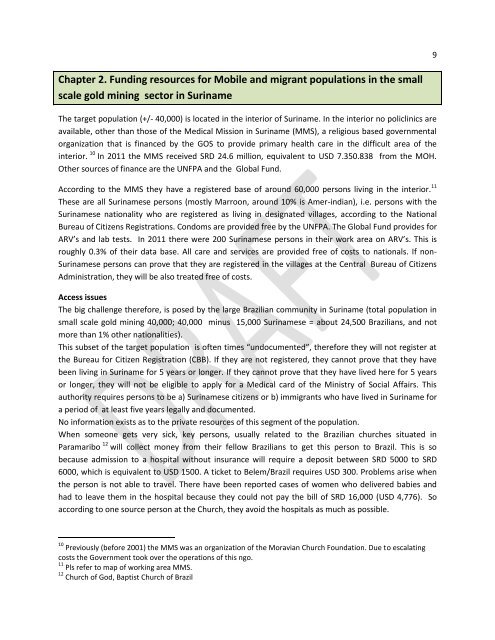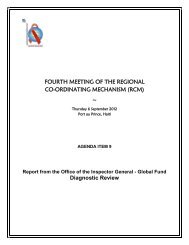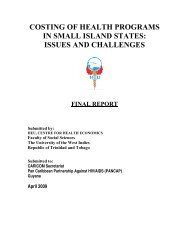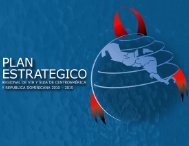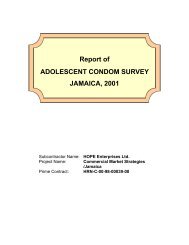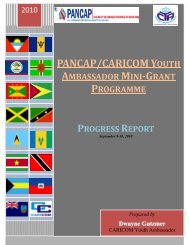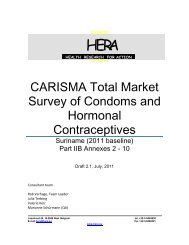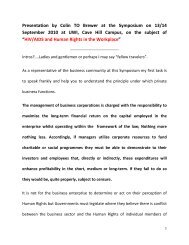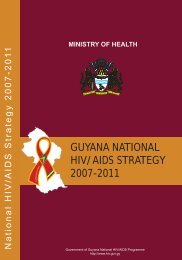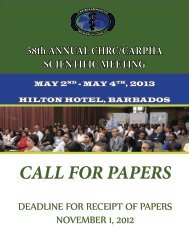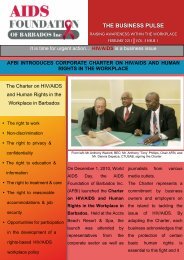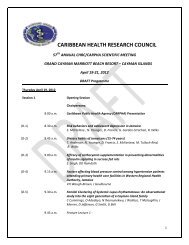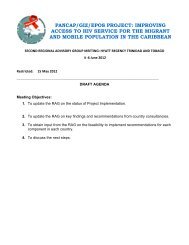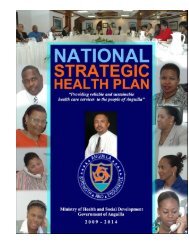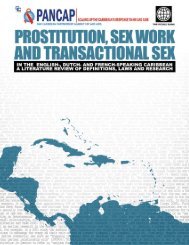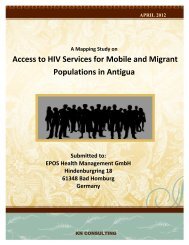pancap/gis/epos improving the access to hiv services for mobile and ...
pancap/gis/epos improving the access to hiv services for mobile and ...
pancap/gis/epos improving the access to hiv services for mobile and ...
Create successful ePaper yourself
Turn your PDF publications into a flip-book with our unique Google optimized e-Paper software.
Chapter 2. Funding resources <strong>for</strong> Mobile <strong>and</strong> migrant populations in <strong>the</strong> small<br />
scale gold mining sec<strong>to</strong>r in Suriname<br />
The target population (+/- 40,000) is located in <strong>the</strong> interior of Suriname. In <strong>the</strong> interior no policlinics are<br />
available, o<strong>the</strong>r than those of <strong>the</strong> Medical Mission in Suriname (MMS), a religious based governmental<br />
organization that is financed by <strong>the</strong> GOS <strong>to</strong> provide primary health care in <strong>the</strong> difficult area of <strong>the</strong><br />
interior. 10 In 2011 <strong>the</strong> MMS received SRD 24.6 million, equivalent <strong>to</strong> USD 7.350.838 from <strong>the</strong> MOH.<br />
O<strong>the</strong>r sources of finance are <strong>the</strong> UNFPA <strong>and</strong> <strong>the</strong> Global Fund.<br />
According <strong>to</strong> <strong>the</strong> MMS <strong>the</strong>y have a re<strong>gis</strong>tered base of around 60,000 persons living in <strong>the</strong> interior. 11<br />
These are all Surinamese persons (mostly Marroon, around 10% is Amer-indian), i.e. persons with <strong>the</strong><br />
Surinamese nationality who are re<strong>gis</strong>tered as living in designated villages, according <strong>to</strong> <strong>the</strong> National<br />
Bureau of Citizens Re<strong>gis</strong>trations. Condoms are provided free by <strong>the</strong> UNFPA. The Global Fund provides <strong>for</strong><br />
ARV’s <strong>and</strong> lab tests. In 2011 <strong>the</strong>re were 200 Surinamese persons in <strong>the</strong>ir work area on ARV’s. This is<br />
roughly 0.3% of <strong>the</strong>ir data base. All care <strong>and</strong> <strong>services</strong> are provided free of costs <strong>to</strong> nationals. If non-<br />
Surinamese persons can prove that <strong>the</strong>y are re<strong>gis</strong>tered in <strong>the</strong> villages at <strong>the</strong> Central Bureau of Citizens<br />
Administration, <strong>the</strong>y will be also treated free of costs.<br />
Access issues<br />
The big challenge <strong>the</strong>re<strong>for</strong>e, is posed by <strong>the</strong> large Brazilian community in Suriname (<strong>to</strong>tal population in<br />
small scale gold mining 40,000; 40,000 minus 15,000 Surinamese = about 24,500 Brazilians, <strong>and</strong> not<br />
more than 1% o<strong>the</strong>r nationalities).<br />
This subset of <strong>the</strong> target population is often times “undocumented”, <strong>the</strong>re<strong>for</strong>e <strong>the</strong>y will not re<strong>gis</strong>ter at<br />
<strong>the</strong> Bureau <strong>for</strong> Citizen Re<strong>gis</strong>tration (CBB). If <strong>the</strong>y are not re<strong>gis</strong>tered, <strong>the</strong>y cannot prove that <strong>the</strong>y have<br />
been living in Suriname <strong>for</strong> 5 years or longer. If <strong>the</strong>y cannot prove that <strong>the</strong>y have lived here <strong>for</strong> 5 years<br />
or longer, <strong>the</strong>y will not be eligible <strong>to</strong> apply <strong>for</strong> a Medical card of <strong>the</strong> Ministry of Social Affairs. This<br />
authority requires persons <strong>to</strong> be a) Surinamese citizens or b) immigrants who have lived in Suriname <strong>for</strong><br />
a period of at least five years legally <strong>and</strong> documented.<br />
No in<strong>for</strong>mation exists as <strong>to</strong> <strong>the</strong> private resources of this segment of <strong>the</strong> population.<br />
When someone gets very sick, key persons, usually related <strong>to</strong> <strong>the</strong> Brazilian churches situated in<br />
Paramaribo 12 will collect money from <strong>the</strong>ir fellow Brazilians <strong>to</strong> get this person <strong>to</strong> Brazil. This is so<br />
because admission <strong>to</strong> a hospital without insurance will require a d<strong>epos</strong>it between SRD 5000 <strong>to</strong> SRD<br />
6000, which is equivalent <strong>to</strong> USD 1500. A ticket <strong>to</strong> Belem/Brazil requires USD 300. Problems arise when<br />
<strong>the</strong> person is not able <strong>to</strong> travel. There have been reported cases of women who delivered babies <strong>and</strong><br />
had <strong>to</strong> leave <strong>the</strong>m in <strong>the</strong> hospital because <strong>the</strong>y could not pay <strong>the</strong> bill of SRD 16,000 (USD 4,776). So<br />
according <strong>to</strong> one source person at <strong>the</strong> Church, <strong>the</strong>y avoid <strong>the</strong> hospitals as much as possible.<br />
10 Previously (be<strong>for</strong>e 2001) <strong>the</strong> MMS was an organization of <strong>the</strong> Moravian Church Foundation. Due <strong>to</strong> escalating<br />
costs <strong>the</strong> Government <strong>to</strong>ok over <strong>the</strong> operations of this ngo.<br />
11 Pls refer <strong>to</strong> map of working area MMS.<br />
12 Church of God, Baptist Church of Brazil<br />
9


